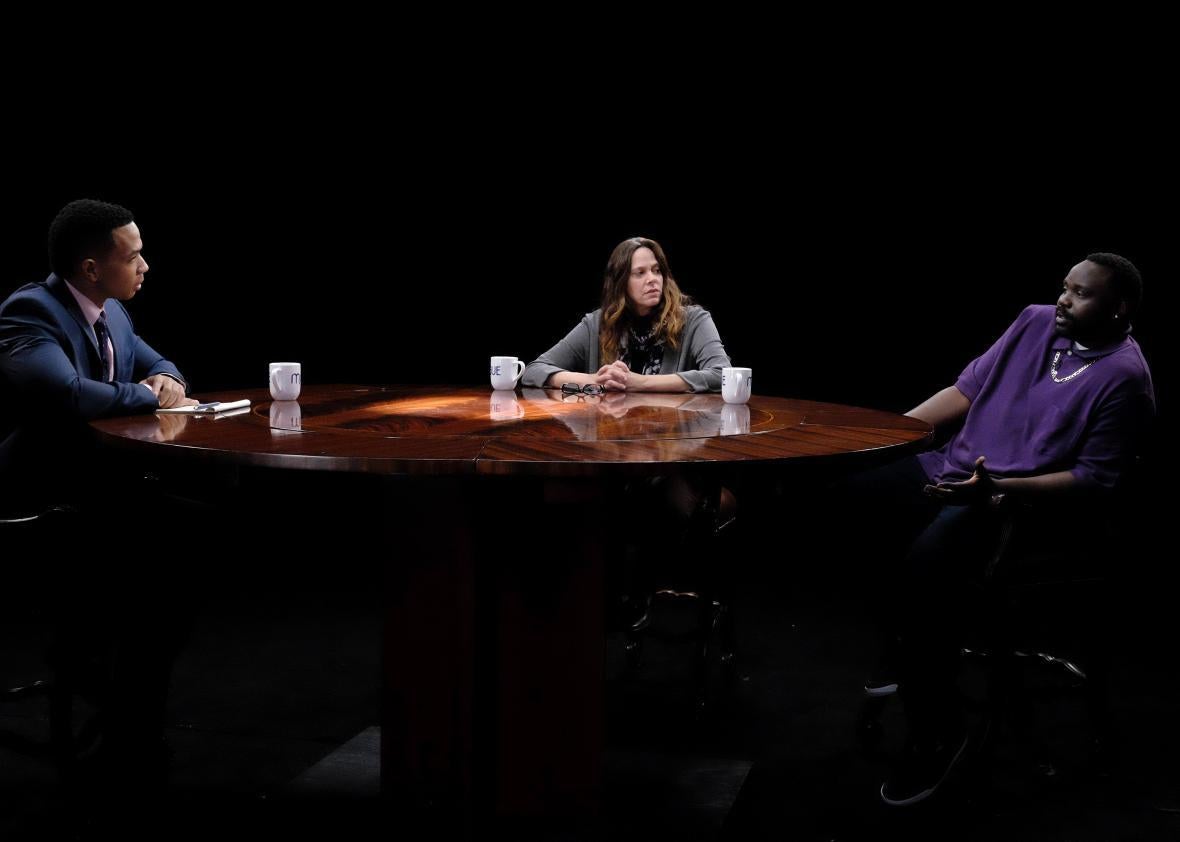In a recent interview with Vulture, Atlanta writer Stephen Glover—brother of creator and star Donald Glover—was coy about the reasoning behind casting a black actor to play a young, immature pop star named Justin Bieber. After suggesting that it was just a chance to do something weird (“No black kid’s ever gonna get the job to portray Justin Bieber”), he added that he “didn’t want to say too much” about it, but “Bieber being black has a lot of layers to it. It means a lot of different things.” To be fair, the whole episode, which consists of a series of disconnected plots in various Twilight Zone–like alternate realities, plays out in a cloud of ambiguity.
The same cannot be said of “B.A.N.,” which aired on Tuesday night. In the show’s most overtly political episode yet, Donald Glover—who wrote and directed it—makes clear his intention to wrestle openly with race, black masculinity, and myriad other of-the-moment topics. In a departure from what we’ve seen so far in the rest of Atlanta, the episode is framed from beginning to end as if you’ve tuned into the Black American Network, an obvious parody of BET. Various pitch-perfect spoofs of commercials targeted at black audiences weave in and out of the show-within-a-show at the center of the episode (more on that in a bit), including a funny but sad kids’ cereal ad skewering police brutality against people of color and a recurring Dodge Charger commercial that ultimately reveals a blistering narrative twist.
There’s a lot to parse, particularly in Montague, that aforementioned show-within-a-show in which a Don Lemon type named Franklin Montague moderates a discussion between Paper Boi (the only regular Atlanta character to appear in the entire episode) and Dr. Debra Holt, head of the Center of Trans American Issues. Paper Boi has recently come under fire for tweeting about not wanting to have sex with Caitlyn Jenner and is unapologetic about the tweet, while Dr. Holt and Montague deem him intolerant of trans people. It’s a fascinating exchange to witness, in no small part because everything about the conversation feels unscripted, as though you were watching an actual segment on, say, CNN or The View, from Paper Boi’s casual annoyance at even being there in the first place (he’s a master at the exasperated eye roll), to Montague’s tendency to leap to preposterous conclusions (the fact that Paper Boi “hates” trans people, Montague states, stems from a “lack of a father” figure), to Dr. Holt’s condescending remarks about the rap community.
The whole clash of personalities feels purposefully reminiscent of any number of real-life interviews between cable news hosts (particularly Lemon) and famous rappers. Last year, for instance, Lemon invited Trinidad James on his show to debate the merits of “the rap community” “profiting” off of the N-word, after a video of an old white woman gleefully repeating the lyrics to his biggest hit went viral. Unlike Paper Boi, James kept his cool throughout, but the overall dynamic was the same: a white talking head, conservative commentator Ben Ferguson, was brought on to discuss the topic and bemoan black people’s use of the word, while Lemon guided the conversation toward a pointless, unresolved conclusion. (Elsewhere, of course, Lemon has also told black people how to be more “respectable” in the wake of the Trayvon Martin case and argued with Talib Kweli about CNN’s coverage of the Ferguson protests.)
What elevates “B.A.N.” above these usually unproductive segments, however, is how it portrays nuance in the personalities of its guests. By the end of the conversation, it’s clear that Atlanta is commenting on our culture’s current crossroads over the policing of speech. Nothing is cut and dry, it seems to say, and attempting to fit every perceived slight as a hateful, malicious offense is shortsighted. Paper Boi calling Caitlyn Jenner’s transition “weird” is, for the most part, called out for what it is—narrow-mindedness and hypermasculine posturing. (Though unfortunately, the episode misses the opportunity to also present how potentially lethal such language can be.) On the other hand, Paper Boi himself isn’t portrayed as a monster but rather as a character more multifaceted than others may perceive him to be. His point about finding it hard to be upset about his own language as a black man who faces his own version of intolerance on a regular basis is not to be discounted. Dr. Holt concedes that he’s entitled to free speech, even if some people found his comments offensive. She even agrees that rap music is no more “detrimental” to youth than rock once ostensibly was.
In showing that Paper Boi isn’t a sinister character who hates trans people, Atlanta critiques how we sometimes rush to condemn un-P.C. speech at the expense of this kind of understanding. (When a bewildered, instigating Montague punctuates a shared moment between Paper Boi and Dr. Holt by blurting out that the rapper “hates women!” the conversation comes to a halt, with a brilliant, deadpan reaction from Paper Boi.) At the same time, it manages to show just how ingrained and pervasive such language really is, without letting Paper Boi off the hook.
